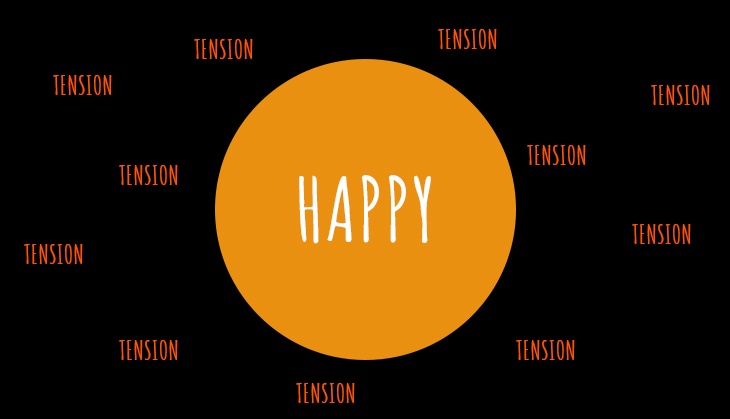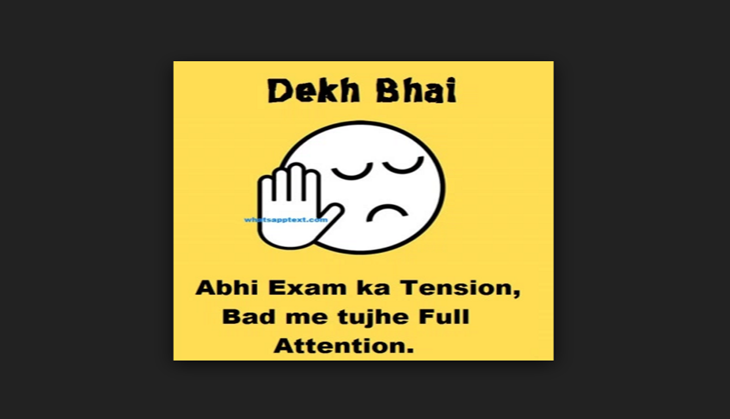Tension: the Great Indian Diagnosis (and what it's got to do with Kangana Ranaut)

Chocolate khaane mein tension hain. Doodh peene mein tension hai. Tension. Tension. Tension.
Tension, as immortalised by Mehboob lyrics in Rangeela, signified confusion. Discomfort. Distress. And we empathised, because we were all veterans to the experience of Tension.
That word would pop up repeatedly in pop culture, with a wide variety of connotations.
In the 2002 Phatela Jeb Sil Jayega number, the chorus would end with,
Tensionkai ko lene ka? Sahi boltai. Sahi boltai.
Tension in this case meant financial duress.
Then came Munnabhai's dictum: Tension lene ka nahi, sirf dene ka. Tension, in this instance, meant bullying.
So deeply ingrained was our understanding of Tension as the reason for all human anguish, as something that was an everyday concern in life, that when we first encountered Tension in the Physics textbook, the term made little sense.
What Tension had to do with the pulley system, no one could fathom. Tension did not belong in a Physics diagram.
Which is why we've mapped it on a diagram of another kind:

Tension was the hold-all antithesis of happiness. Anxiety, sadness, exhaustion, weakness, confusion, stress, nostalgia, heartbreak, heartburn, subjugation, oppression, injustice - everything was Tension.
Yaar, I'm getting tensed up was a turn of phrase that (despite being low on grammar and diction) was able to convey precisely how you felt before a school examination. Tension nahi lene ka, when a colleague is too worried about a bounced cheque. Tension nakko, if you were dragging a socially-awkward friend out for a drink.
The word found great resonance. With the subtext that one must not fall prey to Tension. One must protect oneself from Tension. The secret to happiness was a bye-bye to Tension. And life, it would appear, was full of Tensions.
Tension, Tension, Tension

In 2011, two psychiatrists set out to dissect what the (Great) Indian Tension really encompasses. They asked a group of women to list all symptoms they associated with Tension. If more than two women (of 62) named the same symptom of their own accord, then that symptom would make it to a Tension Freelist.
The symptoms on the Tension Freelist included anger, mood swings, irritability, headaches, desire to become physically violent, physical weakness, stomach pains, loss of appetite, feeling hopeless, not feeling like doing anything and crying.
All 20 symptoms of Tension were also symptoms of clinical depression. Tension, while sometimes being no more then pre-exam jitters, was also a colloquial proxy for a serious mental illness. And more often than not, that illness was depression.
Across various studies, women have reported Tension like this:
She has no money to get her daughters married. So she got tension. Her husband drinks and has threatened to kill the girl-child. So she has Tension. Their child was born pre-mature. So he has Tension. Her husband gave her a thrashing. So she got Tension.
One woman even used Tension as a proxy for a physical illness. "After my husband died I had a lot of tension." The Tension she refers to is Type 2 Diabetes.
In another instance, what a woman reported as Tension, was in fact post-partum depression.
The writing is on the wall. A large majority of Indians have not acquired the vocabulary to articulate mental illnesses.
And in that void, we tend to give every psychological ailment the convenient label of Tension.
But Tension alienates other labels.
Psychological diseases that are not named Tension are no longer relatable. They become foreign. They don't happen to our friends and those we love (who only have passing cases of Tension). They happen to those out of reach, like Kangana Ranaut.
And then real psychological problems become slander
There's been intense conversation lately about precisely what psychological disorder plagues Kangana Ranaut. Someone said she has Asperger's. Another declared it was schizophrenia.
Let's not mull over whether the facts lend themselves to these conclusions. That is a separate conversation, and one we've had a lot of.
The real take-away is this: psychological diseases are an easy way to discredit anyone.
Those hurling these declarations are hurling them as accusations. Not with any degree of insight or empathy (though there may be no need for either in this particular case, because the declarations are thoroughly unfounded), but with malice. The underlying sentiment: psychological diseases help explain criminal behavior. And Ranaut's behavior is (or so they say) criminal.
And that is not an association we'd like to make for a loved one.
Which brings us back to... Tension.
To understand the callous manner in which we're talking about Schizophrenia and Asperger's, we have to first understand the culture of Tension.
When someone we know and like is psychologically distressed, it's Tension. The innocuous label makes it an easy thing to digest. Tension, in the grand culture of Hinglish, is a reasonable response to hardship. And it's utterly relatable.
And this relatability also means that we have tremendous empathy for anything that sounds like Tension.
But none for anything that does not.
First published: 11 May 2016, 9:20 IST






![BJP's Kapil Mishra recreates Shankar Mahadevan’s ‘Breathless’ song to highlight Delhi pollution [WATCH] BJP's Kapil Mishra recreates Shankar Mahadevan’s ‘Breathless’ song to highlight Delhi pollution [WATCH]](https://images.catchnews.com/upload/2022/11/03/kapil-mishra_240884_300x172.png)

![Anupam Kher shares pictures of his toned body on 67th birthday [MUST SEE] Anupam Kher shares pictures of his toned body on 67th birthday [MUST SEE]](https://images.catchnews.com/upload/2022/03/07/Anupam_kher_231145_300x172.jpg)






